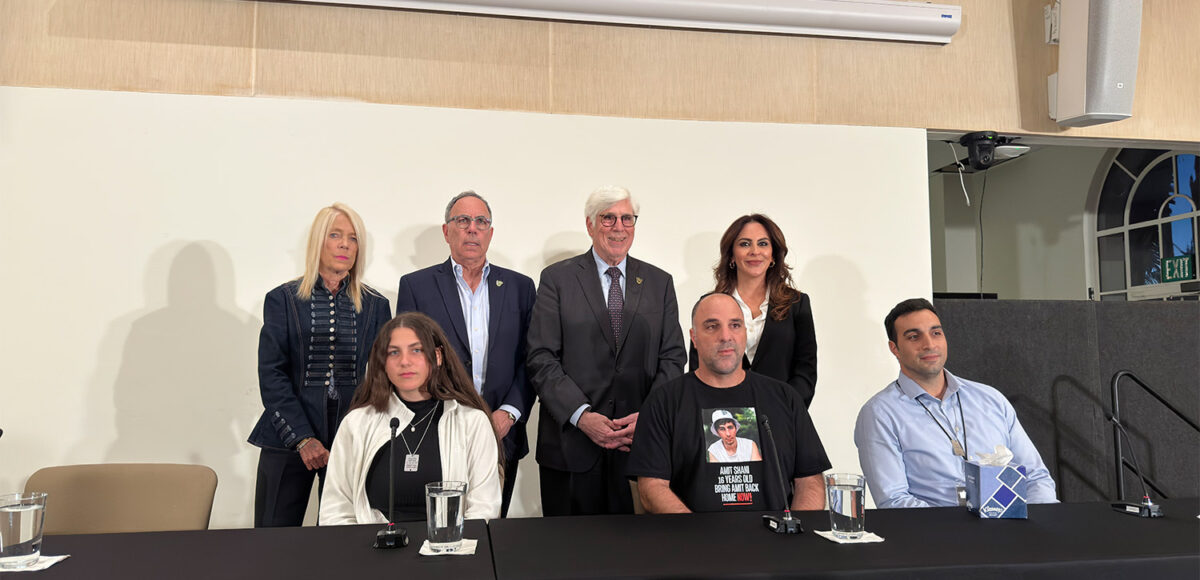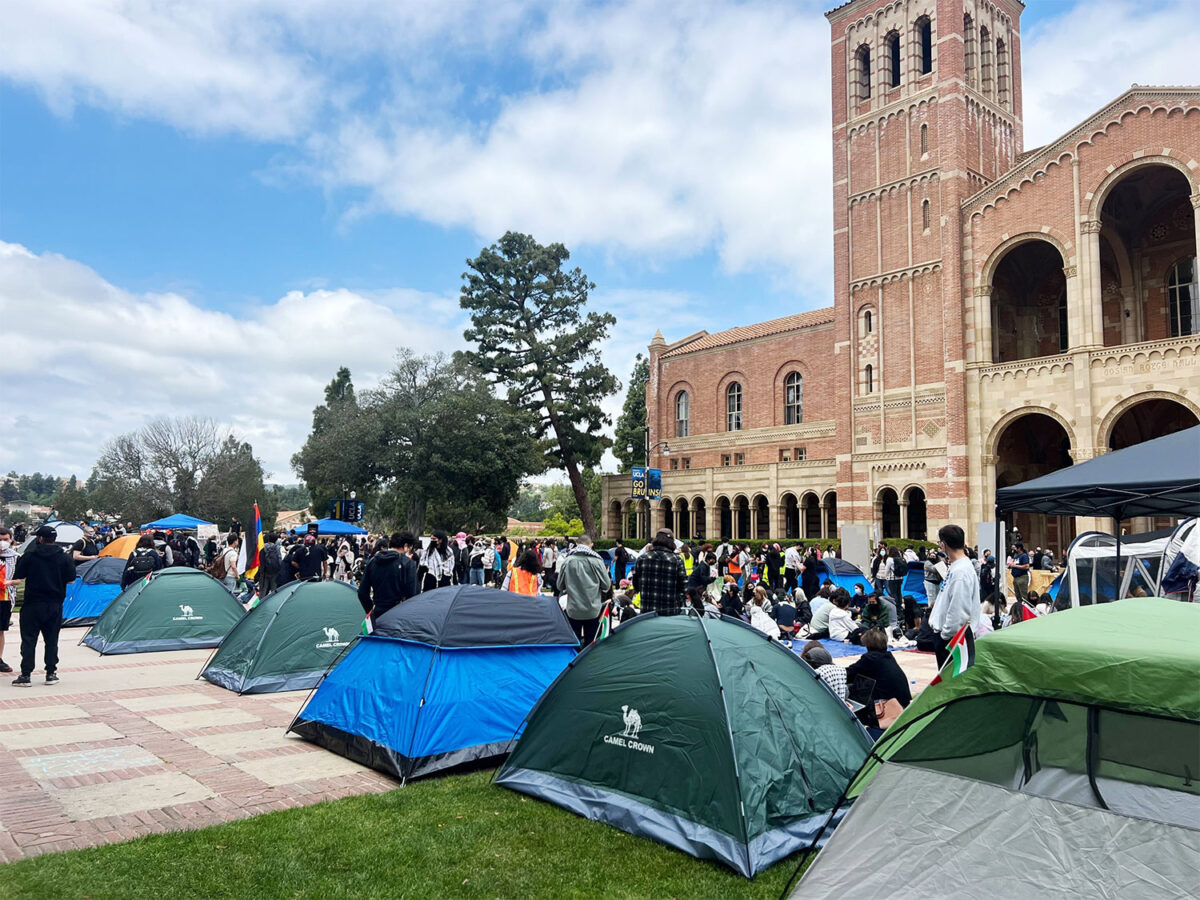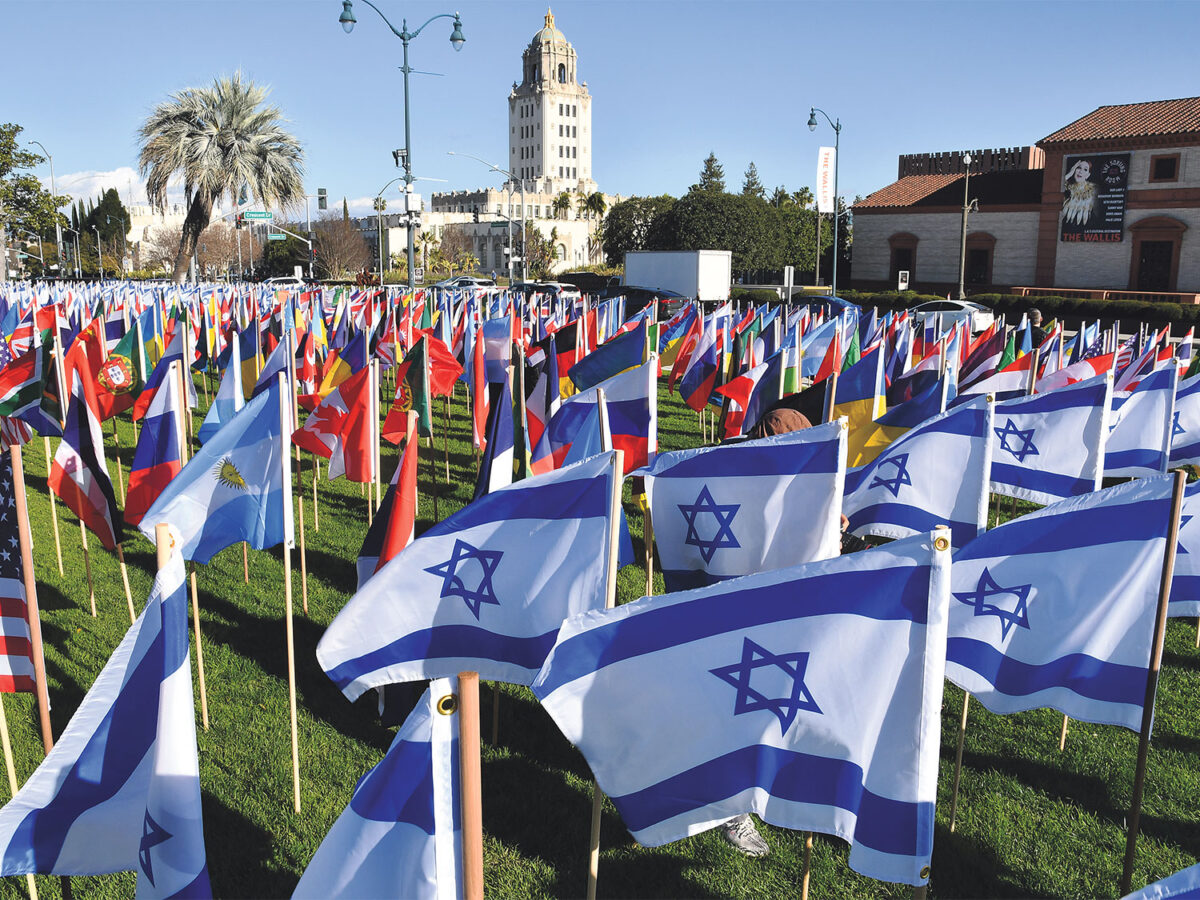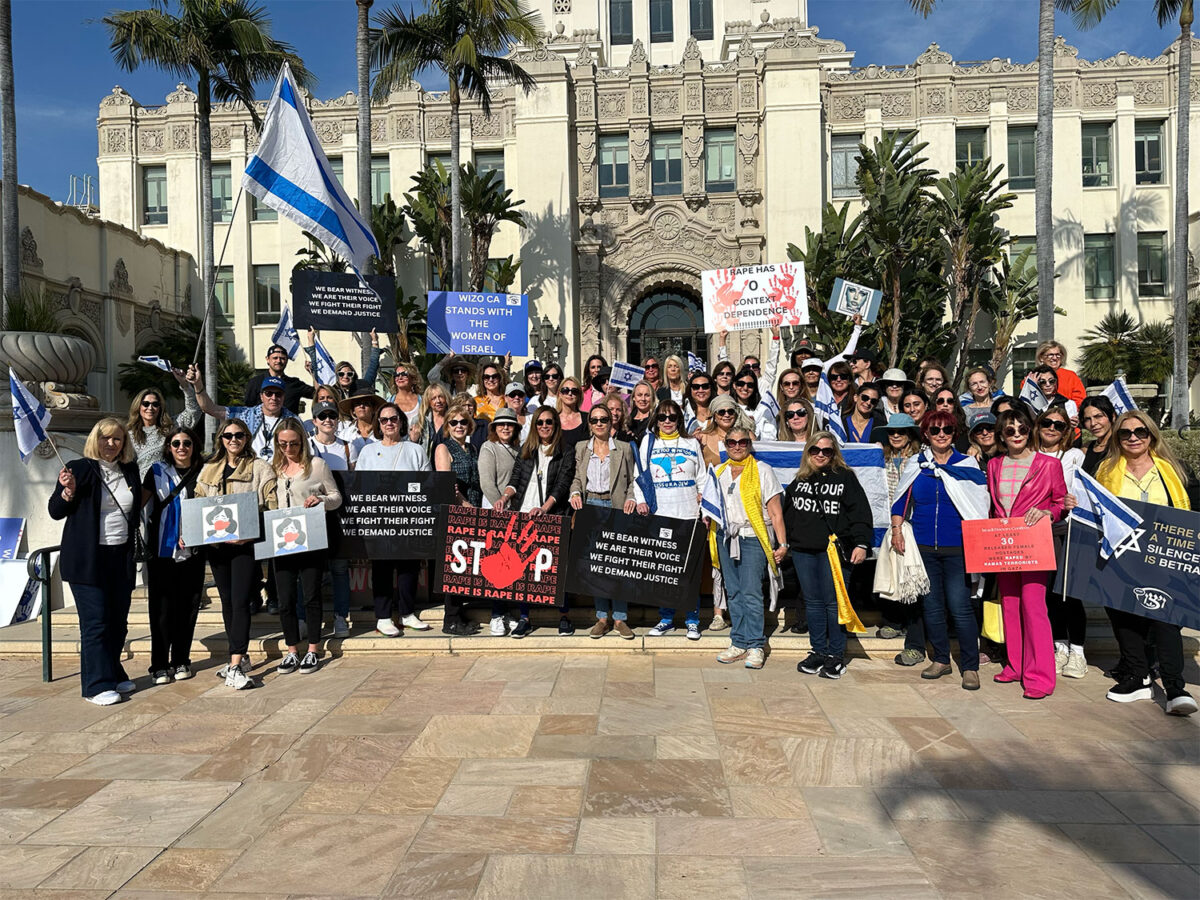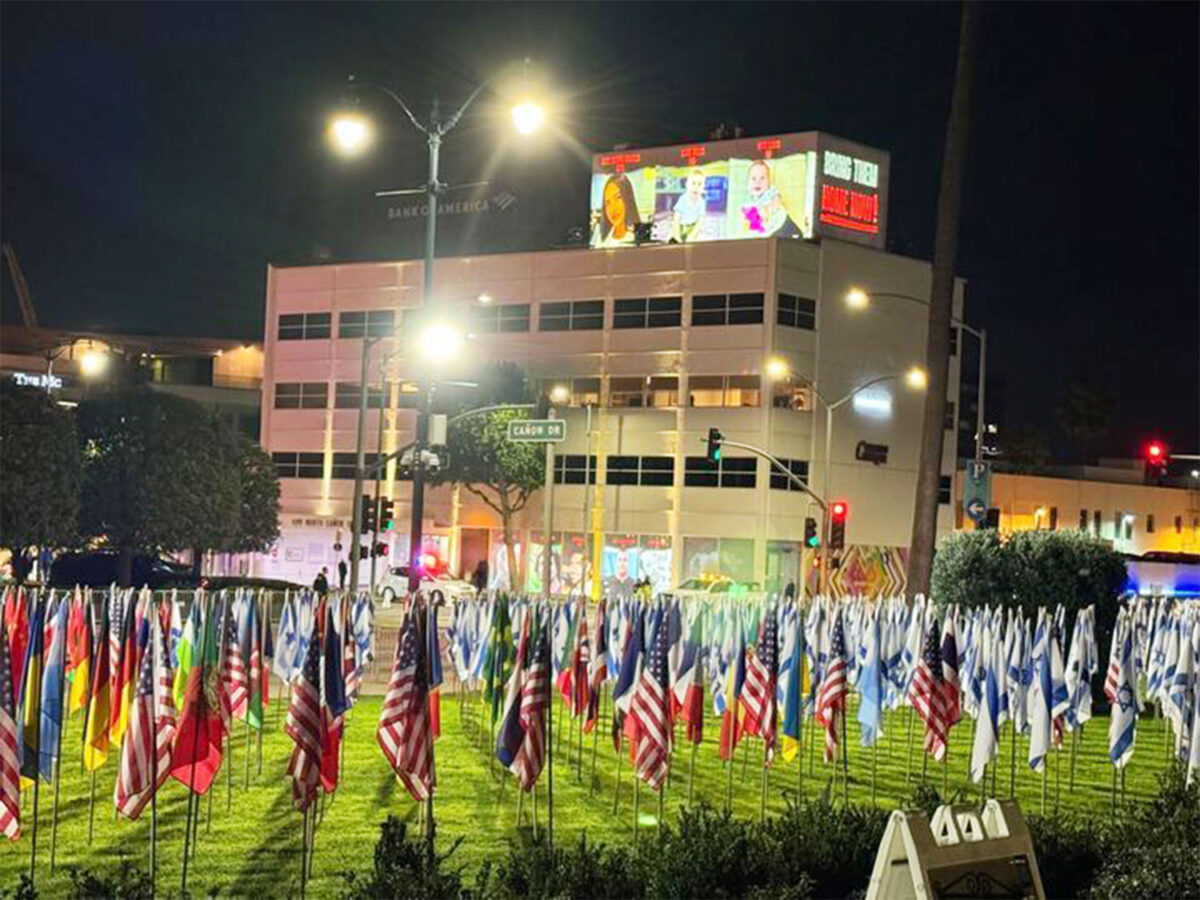Heroes, according to a familiar adage, are ordinary people faced with extraordinary circumstances. An apt description—at first glance—for the individuals who addressed a select audience at the Beverly Hills Municipal Gallery on Nov. 13. But as their presentation unfolded, it became clear that none of them was ever ordinary. Each was destined to bear witness to the events of Oct. 7 that changed their life’s trajectory, leaving loved ones killed and taken hostage.
“It’s unimaginable that we could be here tonight at this moment in time,” said Mayor Dr. Julian Gold in his welcoming remarks. We all want to do something. What can we do? And so tonight is very much a part of what we can do because what we can do is hear their stories and we can become the messengers for their stories.”
Those stories are familiar in their broad strokes, as details began to emerge over one month ago of the worst tragedy to befall the Jewish people since the Holocaust.
“We never imagined arriving at day 36 of this tragedy,” said actress and activist Noa Zahavi, a representative of the hostage families in the United States who is working with the group U.S. Forum for Israel. Zahavi helped bring the speakers from Israel to Beverly Hills for the Nov. 13 event, recognizing the inherent power and influence of the city.
In a hushed Municipal Gallery, and later at a private meeting with the Courier, personal stories of unspeakable tragedy unfolded with steely resolve, dignity and remarkable grace. A month of grief had settled on each speaker’s face, etched also by the unspoken undercurrent that time is running out for their family members.
One by one, each presenter relayed the personal anguish that will one day be the stuff of history books.
Soft-spoken and wearing a T-shirt emblazoned with a photo of his smiling, lookalike son, Nir Shani described his struggle to keep terrorists from breaking the handle to his saferoom door on Oct. 7. A physical therapist by profession, Nir lived at Kibbutz Be’eri, not quite three miles from Gaza.
“One of the terrorists broke the drywall above my ceiling and used a flashlight inside the room to see who was there. I had to hide close to the door so they wouldn’t see me. Then they set a fire and burned the house. I was thinking, ‘Okay, I’m going to die.’ I was texting goodbye notes,” he recounted.
Nir’s ex-wife was sheltering nearby, along with the couple’s son Amit, 16, and their two daughters. Once the attack started, the family kept in touch for a while on WhatsApp. But then Hamas militants dragged Nir’s ex-wife and their children outside and took Amit away in a vehicle. They have not seen or heard from him since.
“When I saw my family that night they were crying and told me Amit was kidnapped. But I felt a relief because I saw my two daughters and my ex-wife and they’re alive, which is a better situation than many others. And when they said he was kidnapped, I heard ‘alive.’ He’s a quiet boy. He’s a sweet boy. He’s demanding little. So, I believe he’s holding on and he’ll be okay eventually,” he said.
Later that evening, Nir implored Courier readers to “do whatever you can to end this nightmare for us. It is non-human. Children shouldn’t be held underground in captivity no matter what. And they should be released and the world should demand that.”
On Oct. 7, Yoni Asher’s wife Doron and their daughters Raz, 4, and Aviv, 2, were visiting Doron’s mother in Nir Oz, a kibbutz only 2 miles from Gaza. Asher, who is in real estate investments, stayed behind at the family’s home in central Israel to work.
“My entire family was kidnapped Oct. 7, 36 days ago. And that is why I’m here today,” Yoni told the Municipal Gallery audience.
When the attack began, Yoni’s wife texted to say they were locked down in a shelter, but then they lost contact. It wasn’t until Hamas released a video a “few nerve-wracking hours later” that Yoni learned the fate of his family.
“I saw on Saturday afternoon my family getting kidnapped in front of my eyes on a video released by Hamas itself, on TikTok. They were attacking the communities, the kibbutz and had GoPros for the horror films,” he told the Courier.
His wife’s mother was killed during the abduction. In the days that followed, Yoni found himself unable to eat or sleep. But he decided that he owed it to his family to care for himself.
“I’m the father. I’m the only man that can represent my family. I’m the only one that can speak out on their behalf. So, I did the bare minimum of eating, the bare minimum of sleeping. And ever since, all I’m doing all morning until night is work and the activity of making them return back home.”
As the days go by, Yoni cannot bring himself to look at photos or videos of his family. “I miss the smell of their hair. I miss the sound of their voice. I am concerned deeply about their mental position, given the fact that they’ve seen their grandmother die in front of their eyes. And I never did so much work and felt so helpless. And that is why I’m here today,” he added.
Since Oct. 7, Yoni has ventured to Germany, to Brussels to speak at the European Union and now to the U.S.
“I know that America and LA are powerful places. And I think that each one of you, now that you’ve heard us, now that you’ve seen us, no one will be able to argue with you because you can say, ‘I spoke with him, I met him.’”
Yoni told the Courier that his level of hope ebbs and flows.
“After 36 long days and long nights, I can’t be more hopeful. I have no time. I don’t know if I can call it maintaining, increasing or decreasing. The emotional state is unbearable. But as a father, the only representative left from my family, it is my obligation to fight.”
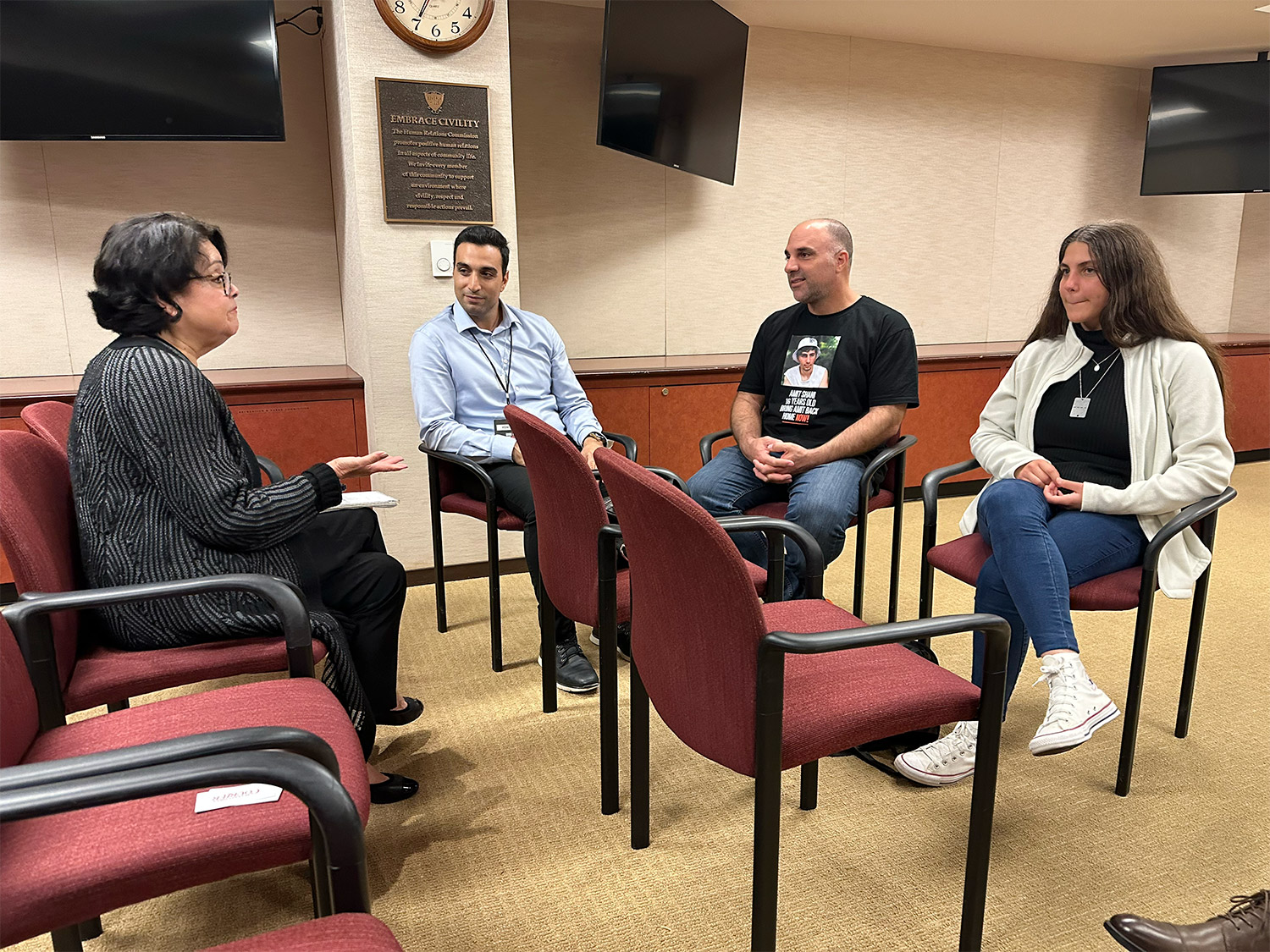
Photo by Lisa Friedman Bloch
Powerful and resolute though the two men were in describing their ordeal, it was the youngest member of the contingent, Ela Shani, whose observations were perhaps the most profound.
Introduced by Zahavi as “little sunshine,” Ela was the first to address the audience and the last to speak privately with the Courier. Ebullient, articulate and self-possessed beyond her years, she was captivating in her descriptions of an idyllic life, innocence lost and the moral imperative to help.
Ela is 14 years old, with long brown tresses and emotive big blue eyes.
She began her remarks in the Municipal Gallery with a description of Kibbutz Be’eri as “a wonderful community that is one big family.”
She continued, “We had 1,200 people, but we knew each and every one of them. Our kibbutz is surrounded with beautiful fields and so many beautiful views. It’s a peaceful place where we all live together. We didn’t need anything else and it was perfect.”
Before Oct. 7, Ela said her biggest problems were “math homework or perhaps an argument with a friend.”
Then, she calmly and vividly described the horrors of that day.
“We woke up with shouting of Arabic and sounds of gunshots. I ran into the safe room with my mother, my little brother and a friend of his. We stayed there. But it wasn’t long before someone tried to break into our house. We turned all the lights off and stayed silent,” she recounted.
As the situation worsened and militants overran the kibbutz, teens began to use a group chat to call for help.
“They were begging for help and we couldn’t help. I’m a 14-year-old girl. I was in the same position, locked in the safe room with my family, with terrorists walking around our yard,” Ela relayed.
More anxious moments came when the family got word that their grandparents had been injured but were still alive. In the early evening, an army unit came to move them out. Ela found herself shielding the eyes of her 8-year-old brother so he wouldn’t see “blood and inner body parts” as they left the kibbutz.
“There was obviously no one to cover my eyes, so I saw it,” she said.
Upon leaving the house, shots began to fire in their direction. They ran over pools of blood and bodies on sidewalks.
“I couldn’t take my eyes off the kibbutz,” said Ela. “I saw houses of my close friends on fire knowing they’re still in there and I have nothing to do but keep running.”
Eventually, she and her family made their way to a bus to join others who had been rescued.
“We started hugging each other even if we don’t like each other very much. We were just happy to see who was alive. And then they started telling us who we lost. And I remember one of my brother’s friends, an 8-year-old boy. He ran to us with blood all over his face. He came to my little brother and said, ‘They killed Dad and my little sister.’ And just let me give you this detail. His sister is 10 months old, she’s a baby. And she was shot while her mother was holding her.”
Ela’s trauma didn’t end after she, her mom and brother were taken to safety in Tel Aviv. A few days later, they received word that a cousin had been asked to identify the body of Ela’s father.
“We buried him one day after they identified him because we just couldn’t keep his body unburied. It was in no condition to stay in the fridge. They didn’t tell me exactly what happened to them. They told me that he was shot and he was burned,” she said.
Ela now realizes she is entering a new phase of her life, although she is but a teenager.
“I miss these little things like going to my grandparents to visit them in the house, just drinking lemonade in the yard or going to my Dad’s to drink coffee with him and talk. And now our life will just be taken from us. Nothing is going to come back to how it was.”
When asked by the Courier if she sees herself destined perhaps for a career where she can help others, she sheepishly whispered.
“My teacher said I could be Prime Minister one day.”
For now, she is using her skills to deliver an eloquent plea for the hostages.
“I’m begging you as someone who went through all of this. I can barely cry. I can barely mourn because people still need us to stay strong. People like my cousin and people like little kids who are still there, kids, elderly, babies, everyone…I opened my speech by saying we’re like a big family and we lost 90 people of our family and one of them is my beloved cousin. And we need them back because my dad can’t come back and my friends can’t come back. But they can. And we need them back because they’re holding us together. And each and every one of them is a whole family. Each one of these 241 people is a whole family that can be destroyed if they won’t come back quickly.”



